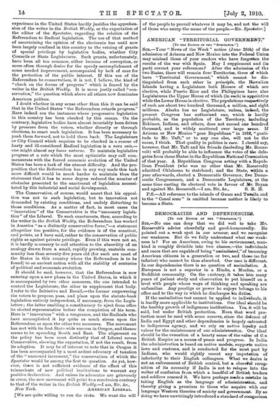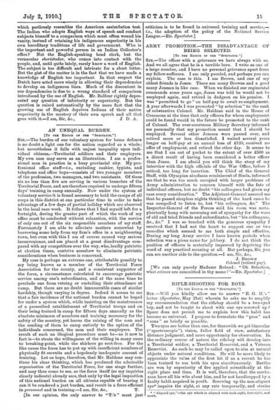DEMOCRACIES AND DEPENDENCIES. [To ME EDITOR or sax " SPZCTATOR.'']
Sin,—No one can deny that we did well to take Mr. Roosevelt's advice cheerfully and good-humouredly. He pointed out a weak spot in our armour, and we recognise our weakness. But do we fully understand what our weak- ness is P For an American, owing to his environment, man- kind is roughly divisible into two classes,—the individuals and races that are capable of being " assimilated," of becoming American citizens in a generation or two, and those (so far inferior) who cannot be thus absorbed. Our case is different. In our dependencies there is no question of assimilation. A European is not a superior in a Hindu, a Muslim, or a Buddhist community. On the contrary, it takes him many years of patient study and observation to put himself on a level with people whose ways of thinking and speaking are unfamiliar. Any prestige or power he enjoys belongs to his office and to the way in which he discharges his duties.
If the assimilation test cannot be applied to individuals, it is hardly more applicable to institutions. Our ideal should be the healthy growth of indigenous institutions. Yes, it will be said, but under British protection. Even that word pro- tection must be used with some reserve, since the defence of India and Egypt and other dependencies is largely entrusted to indigenous agency, and we rely on native loyalty and valour for the maintenance of our administration. Our ideal should be the evocation of a hearty sense of the value of tLe British Empire as a means of peace and progress. In India the administration is based on native models, supports native laws and customs, and is conducted for the most part by Indians, who would rightly resent any imputation of inferiority to their English colleagues. What we desire is not an enforcement of British control, but a cheerful recog- nition of its necessity if India is not to relapse into the welter of confusion from which a handful of British traders and soldiers rescued it. We have perhaps made a mistake in taking English as the language of administration, and thereby giving a premium to those who acquire With our language Western theories of society and government. By so doing we have unwittingly introduced a standard of comparison
which perilously resembles the American assimilation test. The Indian who adopts English ways of speech and conduct subjects himself to a comparison which must often wound his vanity, instead of retaining his indigenous superiority in his own hereditary traditions of life and government. Who is the important and powerful person in an Indian Collector's office P Not the English-speaking head clerk, but the vernacular sheristadar, who comes into contact with the people, and, until quite lately, rarely knew a word of English. The subject is too difficult and intricate for a short letter. But the gist of the matter is in the fact that we have made a knowledge of English too important. In that respect the Dutch have acted more wisely in allowing their dependencies to develop on indigenous lines. Much of the discontent in our dependencies is due to a wrong standard of comparison introduced by the use of English. Mr. Balfour rightly depre- cated any question of inferiority or superiority. But the question is raised automatically by the mere fact that the growing use of English deprives Indians of their native superiority in the mastery of their own speech and all that



















































 Previous page
Previous page